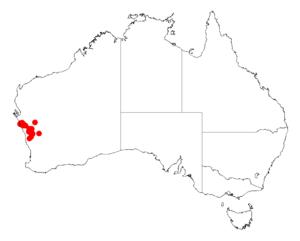Acacia puncticulata facts for kids
Quick facts for kids Acacia puncticulata |
|
|---|---|
| Scientific classification | |
| Genus: |
Acacia
|
| Species: |
puncticulata
|
 |
|
| Occurrence data from AVH | |
Acacia puncticulata is a type of shrub that belongs to the Acacia family. It's special because it only grows naturally in a specific area along the west coast of Australia. This means it's an endemic plant, found nowhere else in the world!
About This Plant
This spreading shrub usually grows to be about 0.5 to 1.8 meters (1.6 to 5.9 feet) tall. It has many branches. Its small branches, called branchlets, are a bit hairy and start out white-grey. As they get older, their outer skin (epidermis) gets cracks.
Leaves and Spines
The plant has straight, spiny parts called stipules, which are like small leaf-like structures at the base of the leaf stalk. These are about 2 to 4 millimeters long and often have hard bases that stay on the plant. Like many Acacia species, it doesn't have true leaves. Instead, it has phyllodes. These are flattened leaf stalks that look and act like leaves.
Phyllodes and Flowers
The phyllodes of Acacia puncticulata are tough, shiny, and dark green. They are shaped like an oval or a wide ellipse. They are usually about 1.5 to 2.5 centimeters long and 7 to 15 millimeters wide. Each phyllode has a clear main vein down the middle.
This plant blooms from August to September. It produces bright yellow flowers. The flowers grow in groups called inflorescences. These flower groups appear one by one in the axils (the angle between a leaf and the stem). Each flower-head is round or oval-shaped and contains 35 to 60 golden-colored flowers.
Seed Pods
After the flowers bloom, seed pods start to form. These seed pods are coiled in a spiral shape. They are tough and smooth, about 4.5 to 5.5 millimeters wide. Inside the pods are dull black to brown seeds. Each seed is oblong (like a stretched circle) and about 3.5 millimeters long.
Where it Grows
Acacia puncticulata is found in the Wheatbelt and Mid West regions of Western Australia. It likes to grow in sandy plains, on rocky granite hills, and on rock outcrops. You can find it in rocky, loamy (a mix of sand, silt, and clay), or sandy soils.
The plant doesn't grow everywhere in these regions; its distribution is "discontinuous," meaning it's found in separate patches. It grows from areas around Perenjori and Three Springs in the southeast, all the way to the Murchison River in the northwest. It often grows as part of tall shrubland areas, sometimes alongside another type of wattle called Acacia acuminata.

